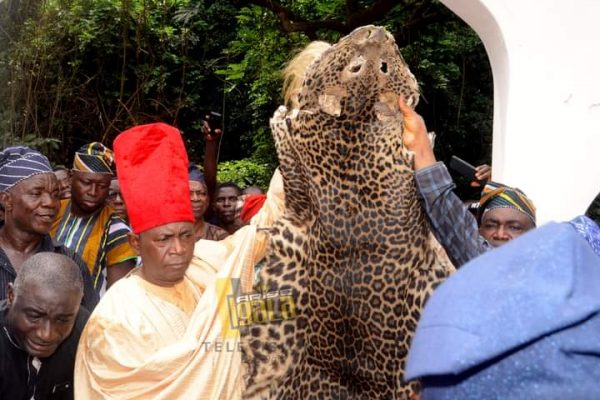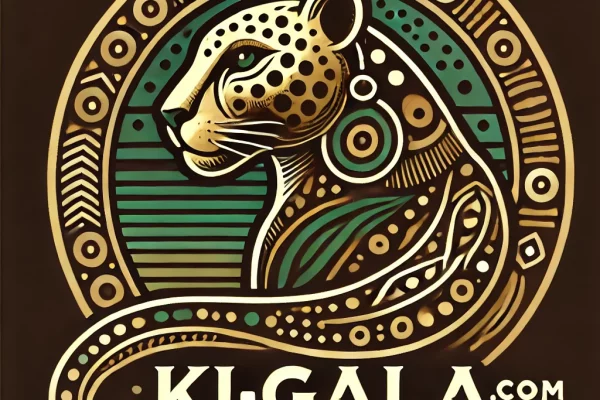
It was around mid-day, our attention was rivetted on a royal fortress – the ‘Òlógbóò-Àtá’ (Palace of the Ata-Igala) Ídá. Situated on the summit of a cliff, the palace overlooks the River Niger – which Igala native speakers call ‘Òhìmìnì fufu,’ as it makes its way southward, heading progressively to the Atlantic Ocean into which it empties its watery baggage. Behind the Ọdọgọ Cliff, which stands at a towering height shy of 190 feet above sea level, is the King’s Palace. It is from there that traditional authority reverberates across the Igala Kingdom, From the seat of power he communes with the gods, the spirits of his ancestors, the chain of kings that have ruled the land since antiquity. In this morning devotion, the Ata Priest-King is said to ‘lift the scepter,’ (Àtá áchí-ókwùtẹ̀) in commemoration of his predecessors.
Replicating the spiritual and secular duties of the Ata are beaded chieftains (Àmonú) who are both his eyes and ears at the provincial levels and perform rites aimed at maintaining peace and tranquility not only in their domains but also in the entire nation,
Miles Clifford, a Colonial Administrator, in his book, A Nigerian Chiefdom published in the Journal of the Royal Anthropological Institute in 1936 a description of the daily routine regarding the Ata’s early morning devotion, which takes place, shortly before sunrise. Ọ̀gbẹ, the Chief Eunuch, arrives the palace and lets himself in through the Ẹ̀gà-Ọ̀̀̀̀̀̀̀̀báde Gate and proceeds to wake up the Ónóji – the Ata’s Chief acolyte and custodian of his regalia and other precious possessions. It is called the ‘Sanctum Santorum’ or ‘The Holy of Holies’, which only the Ónóji enters. He emerges a few moments later with the King’s brass scepter ornamented with different figures and miniature bells, ìjènù. He also brings out nien other staffs representing nine previous Atas, are also brought out by the Onoji and handed to the Chief Eunuch who takes them reverently into the Mánējōò very sacred room, leaning them, in upright positions, against the wall.
The Ónóji, having set the stage for the Òkwùtẹ̀ rite, had entered the sleeping quarters, named ‘Úgbo-k’ejú-ád’ō’ (Where the eyes may see him) – and wakened the Ata. On entering the area, he had humbly squatted, his forehead almost touching the ground, alerted the king that “the sun is soon to rise.” He had also brought some water in a consecrated pot for the king’s ablutions. He had also brought a cloth wrapper, his royal cap and pair of sandals, laying them ready for use. Leaving the Ata to complete his toilet, the acolyte takes a pot of the king’s corn-beer and some kola-nuts across to the Manejoo and informs the Chief Eunuch that “the Ata has arisen in good health” and they both wait for him to emerge. Ọ̀gbẹ̀ greets him and the two of them enter the Manejoo.
Inside are the sacred sceptre, the nine staves, the kola-nuts and the beer, some of which was poured into a small libation bowl. Taking the bowl, the Ata spills some of its content on the ground in front of the Òkwùtẹ̀ and, breaking several of the kola-nuts, scatters the fragments before the staves also. Then, taking the sceptre in his hand, the king strikes the earth with it nine times, calling the name of each ancestor with each strike.
Having thus symbolically fed the ancestors, the Ata concludes the morning rite with the following supplication, which, when translated reads:

“The sun has arisen and I come, as is our custom, to greet you and bid you good health. If, oh ancestors, I am doing that which was done afore-time, and if I am your lawful successor, do then accept my offering and give heed to my prayer. Give health to my people; temper the seasons to our need, that the earth may forth crops in abundance. May our women be fruitful; keep evil and misfortune from us.”
The king asks that, wherever his subjects live across the kingdom, they should show love to one another in unity, as do the fingers on one’s hands.
Finally, he entrusts the land into the protective hands of Ọ́jọ́’ and implores Him to protect the land against defilement so that it could continue to protect and prosper his people. The Àtá himself is then formally served some of the freshly-brewed beer by the Ọ̀gbẹ̀ and the king retires to the Àjẹ́-ókòlò, his informal reception room, where the members of his household come, one after the other, to pay their morning obeisance. He asks after their health, giving all glory to Ọ́jọ́ for keeping them well.
Meanwhile, the vessels used for the libations are scrupulously washed and, with the sceptre and staves, are returned to the Treasure House and the acolyte later sweeps the Majejoo, making it look clean again.

Ẹ́ÑWU ÉGBÁLUKÀ ALU ÍGÁlÁÀ
COUNTING IN IGALA LANGUAGE CARDINAL
(Denoting Quantity)
| Ẹ̀gwéjì | ||
| Thirteen | 13 | Ẹ̀gwẹ́ta |
| Fourteen | 14 | Ẹ̀gwẹ́lẹ̀ |
| Fifteen | 15 | Ẹ̀gwẹ́lū |
| Sixteen | 16 | Ẹ̀gwẹ́fà |
| Seventeen | 17 | Ẹ̀gwébie |
| Eighteen | 18 | Ẹ̀gwẹ́jọ |
| Nineteen | 19 | ẹ̀gwẹ́lā |
| Twenty | 20 | Ógwu |
(ORDINALS)
(Denoting position, order, sequence)
| First | 1st | Éjódùdu |
| Second | 2nd | Ẹ̀kéjì |
| Third | 3rd | Ẹ̀kẹ́ta |
| Fourth | 4th | Ẹ̀kẹ́lẹ̀ |
| Fifth | 5th | Ẹ̀kẹ́lū |
| Sixth | 6th | Ẹ̀kẹ́fà |
| Seventh | 7th | Ẹ̀kébie |
| Eighth | 8th | Ẹ̀kéjọ |
| Ninth | 9th | Ẹ̀kẹ́lā |
| Tenth | 10th | Ẹ̀kẹ́gwā |
| Eleventh | 11th | Ẹ̀kẹ́gwākāà |
| Twelfth | 12th | Ẹ̀kẹ́gwējì |
| Thirteenth | 13th | Ẹ̀kẹ́gwẹ̄ta |
| Fourteenth | 14th | Ẹ̀kẹ́gwẹ̄lẹ̀ |
| Fifteenth | 15th | Ẹ̀kẹ́gwẹ̄lu |
| Sixteenth | 16th | Ẹ̀kẹ́gwẹ̄fà |
| Seventeenth | 17th | Ẹ̀kẹ́gwēbie |
| Eighteenth | 18th | Ẹ̀kẹ́gwẹ̄jọ |
| Nineteenth | 19th | Ẹ̀kẹ́gwẹ̄la |
| Twentieth | 20th | Ẹ̀kóogwu |
(CARDINALS CONTINUED)
| Igala Numbers in words | English Form in Figures | English Form in Words |
| Ógwú ny’ẹ́yọ́ kāà | 21 |
Twenty-one
|
| Ógwú ny’ẹ́yọ́ méjì | 22 |
Twenty-two
|
| Ógwú ny’ẹ́yọ́ mẹ́ta | 23 |
Twenty-three
|
| Ógwú ny’ẹ́yọ́ mẹ́lẹ̀ | 24 |
Twenty-four
|
|
Ógwú ny’ẹ́yọ́ mẹ́lū
|
25 | Twenty-five |
|
Ógwú ny’ẹ́yọ́ mẹ́fà
|
26 |
Twenty-six
|
| Ógwú ny’ẹ́yọ́ mébie | 27 |
Twenty-seven
|
| Ógwú ny’ẹ́yọ́ mẹ́jọ | 28 |
Twenty-eight
|
| Ógwú- ny’ẹ́yọ́ mẹ́lā | 29 |
Twenty-nine
|
|
Ógwú-ẹ́gwā
|
30
|
Thirty |
|
Ógwẹ́gwā ny’ẹ́yọ́ káà
|
31
|
Thirty-one
|
| Ógwẹ́gwā ny’ẹ́yọ́ mẹ́lū | 35 |
Thirty-five
|
|
Ógwẹ́gwā ny’ẹ́yọ́ mẹ́lā
|
39
|
Thirty-nine
|
| Ọ̀gbọ̀méji |
40
|
Forty
|
| Ọ̀gbọ̀méji ny’ẹ́yọ́ káà | 41 |
Forty-one
|
|
Ọ̀gbọ̀méji ny’ẹ́yọ́ mẹ́lā
|
49
|
Forty-nine
|
| Óóje |
50
|
Fifty |
|
Óóje ny’ẹ́yọ́ káà
|
51
|
Fifty-one
|
|
Óóje ny’ẹ́yọ́ mẹ́lā
|
59
|
Fifty-nine |
|
Ọ̀gbọ̀mẹ́ta
|
60
|
Sixty
|
| Ọ̀gbọ̀mẹ́ta ny’ẹ́yọ́ káà |
61
|
Sixty-one |
|
Ọ̀gbọ̀mẹ́ta ny’ẹ́yọ́ mẹ́lā
|
69
|
Sixty-nine
|
| Ẹ̀tẹẹ̀gwá |
70
|
Seventy |
|
Ẹ̀tẹẹ̀gwá ny’ẹ́yọ́ káà
|
71 |
Seventy-one
|
|
Ẹ̀tẹẹ̀gwá ny’ẹ́yọ́ mẹ́lā
|
79 |
Seventy-nine
|
| Ọ̀gbọ̀mẹ́lẹ̀ | 80 |
Eighty
|
| Ọ̀gbọ̀mẹ́lẹ̀ ny’ẹ́yọ́ káà | 81 |
Eighty-one
|
|
Ọ̀gbọ̀mẹ́lẹ̀ ny’ẹ́yọ́ mẹ́lā
|
89
|
Eighty-nine |
| Ẹ̀lẹ̀ẹ̀gwá |
90
|
Ninety
|
|
Ẹ̀lẹ̀ẹ̀gwā ny’ẹ́yọ́ mẹ́lā
|
99
|
Ninety-nine
|
|
Ógwúmẹ́lū
|
100
|
One hundred
|
|
Ógwúmẹ́lū ny’ẹ́yọ́ káà
|
101
|
One hundred and one |
|
Ógwúmẹ́lū ny’ẹ́yọ́ mẹ́lā
|
109
|
One hundred and nine |
|
Ógwúmẹ́lū ny’ẹ́yọ́ ogwú
|
120 | One hundred and twenty |
| Ọ̀gwọ́kọ́ |
200
|
Two hundred |
|
Ólímẹ́fà
|
300 |
Three hundred
|
|
Úlú ọkọ́
|
400 | Four hundred |
|
Ólí mẹ́gwā
|
500 | Five hundred |
|
Ólí mẹ́gwējì
|
600 | Six hundred |
|
Ólí mẹ́gwẹ̄lẹ̀
|
700 | Seven hundred |
|
Íchámúù
|
800 | Eight hundred |
|
Íchámú-ógwúmẹ́lū
|
900 | Nine hundred |
| Àdò-ókáà
OR Íchámú ny’ọ́gwọ̄kọ̄
|
1000 |
One thousand
|
| Àdò olímẹ́gwā | 500,000 |
Five hundred thousand
|
|
Òdulugwu
|
1,000,000 | One million |
| Òdulugwu méjì | 2,000,000 |
Two million
|
| Òdulugwu méjì ny’ólímẹ́gwā | 2,500,000 |
Two million, five hundred thousand
|
| Òdulugwu ugbo òdulugwu | 1,000,000,000 |
One billion etc. etc.
|
VOCABULARY BUILDING
RECAP:
Concrete nouns are names of tangible things that you can SEE, TOUCH and TASTE. These include trees, houses, cars, rivers, birds and other animals you see at home that live in the forest. The foods – rice, beans and ‘ọjẹ̀’ – that you eat, the ẹ̀kàmù (pap) or tea that you drink morning and evening and any other VISIBLE THINGS; they are all CONCRETE NOUNS.
Abstract Nouns
Abstract nouns, on the other hand, are the exact opposite of Concrete nouns. They are the nouns that signify concept, quality or other abstract idea that you can see ONLY IN YOUR MIND’S EYE. They are not physical or tangible objects that one can see, touch, feel and taste. Words like ‘ùyọ̀‘ (joy); ‘ùfẹ̀dọ̀‘ (love); ‘ùmà‘ (knowledge) are examples of abstract nouns.
HOW TO FORM ABSTRACT NOUNS IN IGALA WRITING
Abstract nouns are derived from verbs (action words) or adjectives (words that describe nouns).
To form an abstract noun, simply place a vowel letter before the first (consonant) letter of the verb – the action word.
In the table below, the column on the left contains VERBS, each beginning with a consonant letter. The second column contains the ABSTRACT NOUNS formed from the verbs on the left by simply prefixing vowel letters to them.
̄̄ VERBS ABSTRACT NOUNS
| bá
to boast. E.g. Ì ábá olóló: He/She is too boastful. |
ùbá
boasting. E.g. Ùbá dẹ̄-i kè. (His boastfulness is legendary). |
||
| bi
1. to beg (for). E.g. Ọ́kọ́ ì ábi-í : (He/She is begging for money).
2. to pray; to plead with. E.g. Ọ́jọ́ nà ábi. (I pray to God).
|

|
èbi
1. begging (for alms or charity). E.g. Èbi àbó méjì-í ābi. (These two persons live on begging) 2. prayer; plea; entreaty; supplication. E.g. Èbi nà abi Ọ́jọ́. (I offer prayeŕ to God). |
|
| dọ́ :
to call; to summon. E.g. Ẹ́nẹfu ádọ́ mi. (A white man calling called me).
|
 |
ùdọ́ :
calling (someone). E.g. Údọ́ ẹnẹfu lẹ́ nà áténè éjẹ́-ì. (I am trying to answer that white man’s call). |
 |
| jà :
to fight. E.g. Àtí kà w’uwa k’aa ja. (Àtí asked us to fight).
jọ : to sit together; to assemble; to congregate.
|
|
ùjà :
fight; bout; prize fight. E.g. Ùjà Mohammed Ali à ágòó-ì. (We are watching Mohammed Ali’s fights.
ùjọ : gathering; assembly. E.g. Ùjọ ìlò ùnyọ̀gbá à wá-i. (We have come for a meeting to discuss progress). |

|
| kwà:
to scream; to yell. E.g. Ẹ́ñwú chi k’ì ákwà? (Why is he/she screaming? |
 |
ùkwà :
scream; cry; yell. E.g. Ùkwà wẹ jí úmi olu-í. (It was your scream that woke me up). |
|
| mí :
to rest; to relax. E.g. Ù gwùgwú ọ́mọ̄ ámí. (I sat there seated and resting).
|
|
úmí :
rest; respite; break; relaxation. E.g. Ìkò ùmí líyā, ẹ mí. (When the time for rest comes, rest).
|
 |
| 1. nyọ̀ (adj.)
to be good; to have a good conscience; to be virtuous, upright & God-fearing. E.g. Ì cheé nyọ́ọ̀. (It is good).
2. nyọ̀: (adj.) to be handsome or beautiful. E.g. Ọ́ma-i nyọ́ gbẹ̀ẹ̀. (This boy/girl is very handsome/ beautiful). |

|
1. (a) ẹ̀nyọ̀ : goodness; virtuousness. E.g. Ẹ́nẹ ẹ̀nyọ̀ ẹ̀ che. (You are a good person).
(b) good things; blessings; luck. E.g. Ẹ̀nyọ̀ ágbẹrẹ̀ ẹ̀nyọ̀. (Good attracts good).
2. ùnyọ̀: beauty; handsomeness. E.g.Ódú Àdígò èkéjì ch’Ùnyọ̀. (Àdígò’s second name is Ùnyọ̀, Beauty). |

Ùnyọ̀ |
| ñwọ́ :
to react to alcohol. E.g. Ọ́tẹ́ ì áñwọ́-ì. (He/She is under the influence of alcohol).
|
ùñwọ́ :
being under the influence of something. E.g. Ùñwọ́ ọkọ́ átā ñwu ì áñwọ́ lẹ̀. (He/She is influenced by his father’s wealth to misbehave like this).
|
||
| wọ̀ :
to pain; to ache; to throb. E.g. Ójí áwọ̀ mi. (I have a headache). |
ìwọ̀ :
pain; ache; discomfort. E.g. Ìwọ̀ ọma-ébíi gbẹ̀. (The pain of child-birth is excruciating). |
||
| rà
to blossom; to flourish. E.g. Úchẹ́ mi rà t’óko. (My crops are blooming on the farm).
|
 |
ùrà
wealth; treasure; riches. E.g. Ùrà ùjẹñwu dẹ́ wa. (We have abundant food).
|

|
| yọ́ :
to melt; to thaw; to liquify. E.g. Òkwúta-ọmọjọ́chà hàí mú yọ́ mẹ̀. (That hail-stone has melted).
|
ẹ̀yọ́ :
the melted form of something. E.g. Ẹ̀yọ́ ekpo-ọ̀jẹ̀ k’ì bọ̀ dẹ́ẹ̀. (This is the melted fremains of the palm-oil).
|
||
| yọ̀
to be happy; to be in high spirits. E.g. Álu k’ù fù ú lí, ù chánẹ́ éyọ́ọ̀. When I saw him/her, I became glad, |
|
ùyọ̀
joy; gladness; bliss. E.g. Ùyọ̀ ọkọ ñ’ọya k’í d’úgbo mẹ méjì. (Let marital bliss be with both of you. |
 |
ABSTRACT NOUNS DERIVED FROM PHRASAL VERBS
A phrasal verb is the verb that has another word (a noun) joined to it as an adjunct. In writing a phrasal verb, the last vowel in the verb is usually elided (left out) and is replaced by an apostrophe, as shown below. For example, the verb, lo + úchẹ́ = l(o)uchẹ́ (to farm), whose terminal vowel, ‘o’, is omitted and an apostrophe replaces it, showing that a vowel is missing. So our word will now read, l’uchẹ́. In the phrasal verbs treated below, you will see how apostrophes are used to send the message of elision. At times, an apostrophe may be considered optional, as in the words, ‘tido,’ ( to dance) ‘jẹñwu’ (to eat), ‘rúlé’ (to run), ‘gbúlù’ (to smell something.)
PHRASAL VERBS ABSTRACT NOUNS

ch(e)ọ̀wọ̀ or ch’ọ̀wọ̀ (of a Muslim) (to pray) ọ̀wọ̀-éche (formal praying)
 n(é)ányà or n’ánya (to ride a bicycle) ànyà-éné (cycling)
n(é)ányà or n’ánya (to ride a bicycle) ànyà-éné (cycling) 
ny(í)ányī or ny’ányī (to laugh) ànyí-ényi (laughter; laughing)
 b’ọ́ma ch’iyà (to play with a child) ọ́ma-ébọ-ch’iyà(playing with a child)
b’ọ́ma ch’iyà (to play with a child) ọ́ma-ébọ-ch’iyà(playing with a child)

k(à)ọ̀là-Ọjó or k’ọ̀là-Ọjọ́ (to preach) ọ̀là-Ọjọ́-ékáà (preaching)

kọchẹ̄-ọ̀tákída (to study) ọ̀tákída-ékọ́chẹ̄(studies; studying)

t(a)idó) or t’idó/tido (to dance) ídó-éta (dancing)

t(a)olí or t’olí (to shoot a gun) ólí-éta (shooting)
IGALA KINGSHIP HISTORY

Igala history is a priceless legacy that Igalas of the present generation are compelled to preserve for effective transfer to the next generation in undiluted form. A people’s history fraught with controversies and distortions cannot stand the test of time. It is to avoid such a calamity that this blog post is being placed in the public domain. There is no doubt the effectiveness of the social media as an outlet for write-ups on the language, history and culture of the Igalas. However, it has been painfully observed that the version of Igala kingship history that is being churned out on the social media is, sometimes, misleading, as some of the narratives are supported only by oral tradition, which could lend itself to distortions, misrepresentations or even outright fallacies. Some of the distortions recently observed on Facebook and Whatsapp are examined below. The true versions of such distortions, which are based on research findings, are provided in each case.
DISTORTION NO. 1
The first distortion is that Àbùtù Ẹ̀jẹ̀ was the first Ata-Igalaa in history
This statement that Àbùtù Ẹ̀jẹ̀ was the first Ata-Igalaa ever is misleading, as Àbùtù Ẹ̀jẹ̀ (or his daughter, Ébúlẹẹ́jonú), belong to the Third Dynasty; that is, the ruling Jukun (or Apa) Dynasty, which, according to R. A. Sargent, commenced in 1687 AD, the same year the reign of the Bini Dynasty came to an end. The influx of the Jukuns, who had broken away from the Kwararafa Confederacy, occurred between 1597 AD and 1627 AD. At this time, the Aji Ata (or Bini) Dynasty, under which a total of six Bini-speaking Atas ruled, had forced itself on the Igala Kingdom in 1507 AD, forcing Ata Ọgáláà Eri to proceed on a sudden self-exile. It should also be noted that the Bini Dynasty was itself preceded by an earlier dynasty, the Ata Eri (or Igala) Dynasty. The findings of a 21-year research undertaken by the Catherine Acholonu International Research Centre, Abuja revealed that “Ata Eri was the ancestor and father of the Igalas and the founder of the still-surviving, ancient lineage of Atta Kings of the Igala nation.” Ata Ọgáláà Eri had succeeded Àtá Àtá-Ógwū, after whom the Àtá-Ógwū Hill (Ójúwó Átōgwu) on the outskirts of Ida town was named.
(ii) THE AJI-ATTAH (ATA) (OR BINI) DYNASTY
In the year, 1507, Ọba Ọ̀kpámẹ̀ Ọ̀zọ́luà of Benin ordered his son, Aji-Attah (Ata), to lead a segment of the Bini army against Ata Ọgáláà Erí at Ida, which prompted a sudden journey of the incumbent into self-exile, first, to the southern part of the Benue Basin, then later, to Nri in the present-day Anambra State. The Aji-Attah (or Benin) Dynasty, after one hundred and eighty years at Ida, was finally brought to an end by the influence of the Kwararafa traders-cum-warriors who were pouring into what, today, is referred to as the Igala Kingdom, which, according to Sargent and Miles Clifford, had been occupied by the “Okpoto tribesmen.”
DISTORTION NO. 2.
That Àtá Ayẹ̀gbà Ọma Ìdoko sacrificed his beloved daughter, Princess Íníkpi, as demanded by the spirits of the land, in the wake of the Igala-Benin War; while her sister, Ọ́modòkó, was sacrificed in respect of the Igala – Jukun War.
Íníkpi was buried alive at Ọ́gbẹ́gà as the Igala-Jukun War was looming. The war was eventually fought about the year, 1690 AD, at the twilight of 17th Century. By this time, the Igala-Benin War had been fought and lost about 174 years earlier, when Idoko, Ayegba’s father had not even been born. After the Apa War ended in Ayegba’s favour, he celebrated his victory by sacrificing three more of his daughters, namely: Ọ́modòkó (who was buried on the western bank of River Ínáchaló) as well as Ónojò Alíkáà and Ónojò Alẹ́gbẹ̄ who were both buried at two separate spots in Ídá town.
Distortion No. 3
That a Muslim occultist from Bebeji on the outskirts of Kano was the Mallam hired by Ayegba to perform some rites on the western bank of River Inachalo at Ida while the Jukun (Apa) invaders were camping at the opposite bank of the river.
Miles Clifford, a colonial officer who had carried out a research into the Apa War, states that a Nupe Mallam called Edegi was employed to perform the rite mentioned above and was responsible for Ayegba’s victory in the war. Overjoyed by that historic victory, Ata Ayegba betrothed one of his daughters named Ódó, to Mallam Edegi in addition to the huge financial reward the king had gratefully given him earlier. Mallam Edegi had thanked the king most profoundly and, together with his own followers, he rowed upstream of the Niger towards Rabba (in Nupeland). He finally settled down at a place he named Àbó-Idá (Ídá people), which, over time, changed to ‘Bídā,’ as it is still called to date.
Distortion No. 4
That the Igala Kingdom has never been defeated in any war in all of its history.
This statement is not true, as there are three or so recorded wars in which the Igalaa army was roundly defeated and had to beat a hasty retreat in each case. These are as follows:
- The Benin Empires conquest and occupation of Igalaland in 1507 AD when the Igala army was no match for the more numerous soldiers of the Benin army
- The Igala-Benin War of 1515-1516 AD; and
- The Bassa Komo Rebellion in 1856 AD.
The first was the war led by a Benin Prince, Aji Attah (Ata) against Ata Ọgálá Eri in 1507. Robert Arthur Sargent, in his 1984 PhD Thesis, titled, Politics and Economics in the Benue Basin, reports that the Benin army had attacked, conquered and occupied the Igalaland to establish a Bini (or Aji Ata) Dynasty.
The second war in which the Igala troops were defeated was the Aji-Attah-Oba Esigie face-off – a war of two brothers having the same father – which early historians erroneously referred to-as the “gala-Benin War” of 1515-1516. Eight years after Aji Ata had conquered and seized the Ata’s throne and land, he mobilized the Kingdom’s army to fight and remove his brother, Oba Esigie who was installed in 1509 and take over the throne; but the Igala army was roundly defeated. While some settled at the present-day Ebu, near Asaba, others settled at Ibaji and Ilushi (Òjìgónó) area of Edo State.
Prince Okoliko, who later became the Ata-Igalaa between 1870 and 1876, had teamed up with a man named Ódomà Abáláká of the Òhiémi Ọ̀bọgọ Lineage to rustle the Bassa Komo camp at the present-day Ògwùmà on the bank of the River Benue when they were pouring into Igalaland in large numbers, fleeing from slave raiders, and were given refuge by Ata Aame Ocheje (1835 – 1856). Okoliko and Odoma had formed the habit of sneaking into the Bassa camp, stealing them and selling them into slavery. The victims sent word across to their kith and kin who mobilized a formidable force against their transgressors. In the war that ensued, the Igala army was driven into a mire and were killed in large numbers. Odoma and Okoliko narrowly escaped death, as their troops were mowed down by the aggrieved Bassa warriors.
A comprehensive account of the the Bassa Komo Rebellion, see the Postscript section of my book, titled, An Igala-English Lexicon, under the heading Odoma Abalaka (p. 619-620).
Distortion No. 4
That Ákwùmábì was the first son of Àtá Ayẹ̀gbà Ọma Ìdoko; while Ákogwu was his second son.
According to the Igala native law of primogeniture, it is the first-born son that succeeds his father upon the latter’s demise. However, in the case of Ákwùmábì and his brother, Ákogwu, that law did not apply. In fact, Àtá Onákpa Akwùmábì was NOT the first son of Ayẹ̀gbà but the second; while Akogwu was his eldest son. When Ayegba passed on, Akogwu was preoccupied with their father’s burial arrangements; and his younger brother, Ákwùmábì (or ‘Akwu’ for short) … was busy lobbying the king-makers to install him as their father’s successor. He had killed the sentry at the rear gate of the palace to let himself into the palace, from where he sent for the king-makers to come and perform coronation rites on him. When all that was happening, Akogwu’s sympathisers had blocked the front gate to prevent Akwu from entering. The name, Akwumabi, is the short form of the name he took upon his investiture: “Ákpa adàkwù m’ákwù bì” (The killer of the sentry at the gate (ádàkwù) opened the gate) for himself. Details of the story of Akwu’s usurpation of the throne are contained in the Postscript section of An Igala-English Lexicon by John Idakwoji, p. 576-577.
Distortion No. 6
That Àtá Àámẹ́ẹ̀ Òchéje, following the assassination of his immediate predecessor, Àtá Ẹkẹ̀lẹ̀-Àgà in 1834, replaced all the Kingmakers with Royal Councillors.
When Àtá Ẹkẹ̀lẹ̀-Àgà was murdered in his sleep in 1834, Àtá Àámẹ́ẹ̀ Òchéje, his successor dissolved the entire membership of the Ígálámẹla Council of King-makers, which was later reconstituted to include two members from the Ata’s family, the Ánanyà-Àtá and the Áchanyà-Àtá to be the eyes and ears of the king on the Council. The Royal Councillors, as Officers of State, played advisory roles as the closest persons to the king. Originally, they were sons of Ayegba who first appointed them into office.
́















